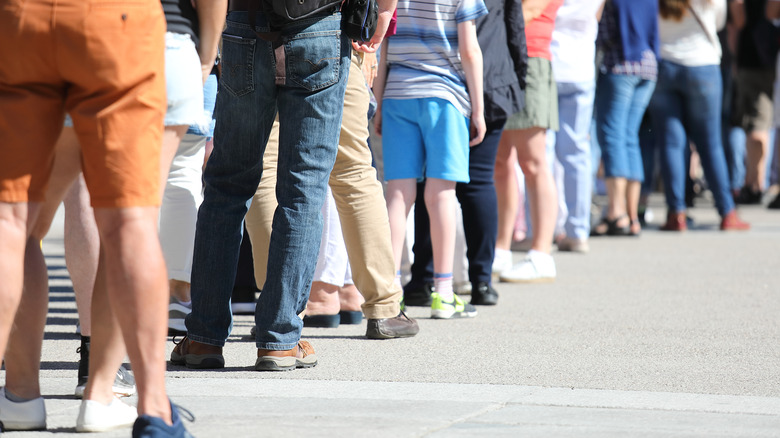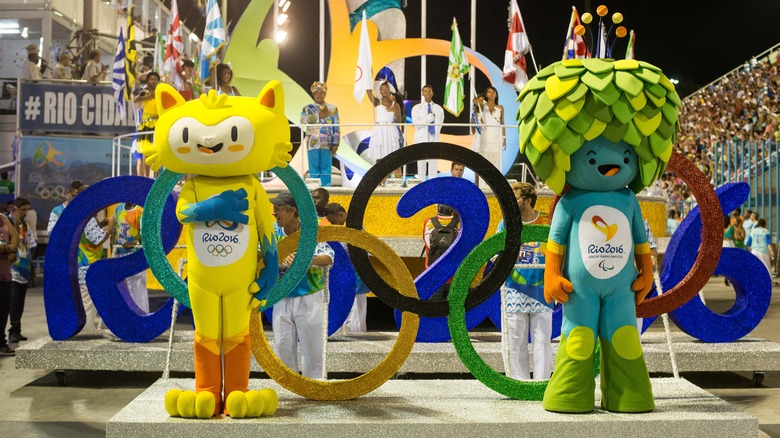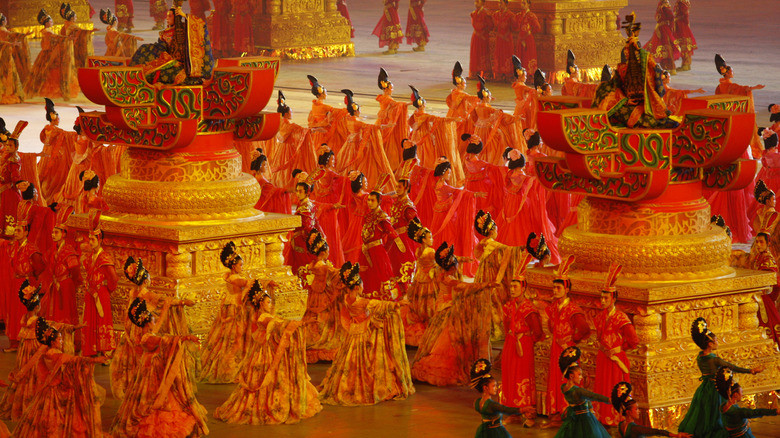What It's Really Like To Go To The Olympics As A Spectator
The Olympic Games are one of the most-watched televised events, garnering billions of viewers all over the globe, with the 2008 Beijing Olympic Games holding the Guinness World Record for having the largest Olympic television viewership at 4.7 billion. That translates to about 70% of the world's population at the time. The large number is staggering, but it's no surprise as fans all over the globe show their support for their country's athletes in different sporting events.
Although it's fun to watch the Games from home, it's also a completely different experience seeing athletes in the flesh. Plenty of people also opt to travel to the Olympic Games' location to see the events live, if only to catch a glimpse of their favorite athlete in action. The number of tickets sold at the Olympic Games is in the millions, with some planning their trip months in advance. A lot of preparation goes into it, and in addition, expenses must be considered as well. So, what is it like to attend the Olympics as a spectator?
Planning ahead
One of the reasons why countries bid to host the Olympic Games is for the boost in tourism. As mentioned, millions of people flock to a host country to watch the events, and this is a way for a country to show off its culture. First off, spectators need to purchase tickets to attend. Thanks to COVID-19, though, this year is expected to look quite different from a normal year.
It's expected to spend thousands of dollars when attending the Olympics live, but planning ahead can save money. For lodging, a veteran spectator, George Reed-Dellinger, suggests leasing an apartment or looking for a location other than hotels near the Games. "Never stay at hotels. They are booked by corporations at three times the going rate," he said (via The Seattle Times). It's also wise to plan which events to attend ahead of time to be able to come up with a schedule. For the most part, traveling to see the Olympics in person is much like preparing for a vacation.
Waiting and traveling
Spectators, as expected, have a lot of waiting to do before they see athletes compete. Traveling also takes time, especially if the lodging is away from event locations. Veteran spectator George Reed-Dellinger recounted his experience at the Vancouver Olympic Games in 2010 where he started a day at 4 a.m. to travel for hours just to get to an event's location, per The Seattle Times. "We left at 4 a.m., took a cab down to the wharf, then took a water taxi across the sound, a two-hour bus to Whistler Mountain, and walked no less than a mile," he said. He then waited in line with other spectators just to witness an event that lasted less than an hour.
Another spectator, Mitch Goldich, shared his experience as a first-time Olympics producer back in 2018 Sports Illustrated. He covered the PyeongChang Olympics in South Korea and although he was part of the press, he too did a lot of traveling and waiting.
Attending free Olympics events
Olympic Games are not just about sporting events. Host cities also provide other forms of entertainment for spectators. Often, the location is close to the Olympic Stadium where booths, stages, and exhibits can be found. Sponsors can host games where prizes can be won and souvenirs may be given for free as well, per Smarter Travel. Furthermore, jumbotrons and monitors may also be present in the area, providing up-to-date information on the events happening at the Olympics. This is a great way of enjoying the festivities free of charge.
There are also Olympic events that spectators can watch free of charge. Some sports, such as sailing, triathlon, and cycling, can't be held in an enclosed space and are typically held in public areas. This is when spectators are free to catch a glimpse of the events without having to purchase a ticket. Wherever the Olympics may be held, there are sure to be events and celebrations that spectators can attend free of charge.
Exciting atmosphere
There's no doubt that watching the Olympic Games live is very different than spectating via a television screen. There's a different thrill when you are in an atmosphere where thousands of people are just as excited as you are. Joon Lee of Bleacher Report described just how different it can be. "The pristine packaging you see on TV is just a small fraction of what makes the Games so special," he said.
Lee attended the Olympic Games in 2018 in South Korea for the first time, only having watched the Games from TV prior. He compared the feeling of being in the Olympics to "seeing the Mona Lisa in person," and even then, he said it's difficult to put into words the feeling of being there. Another spectator, Kiratiana Freelon, shared her Olympic Games experience with Huffington Post and said the atmosphere and energy of the athletes rub off on spectators. "After attending an Olympic Games, I feel like I can do anything," she said.
This may perhaps be the reason why some people make it their goal to attend every Olympic Games. The waiting, traveling, and spending are all worth experiencing the thrill of being there.
Learning about new cultures
Every country that hosts the Olympic Games makes an effort to showcase its culture to attendees. Spectators not only get to watch sporting events, but they also get to learn more about the host country's culture. Years of planning go into the Olympic Games and countries make sure to put their best foot forward. As Kiratiana Freelon said, "it's culture on steroids," per Huffington Post. This is a great way for spectators to learn about new cultures that they would otherwise not be interested in if it weren't for the Olympics.
Meeting people from different parts of the world is also one of the best things about being a spectator, and it's common to strike up conversations with strangers. Although the Olympic Games is a competition among nations, the atmosphere is friendly and you can meet a person from just about any country. It's a nice way to broaden your horizons and expand your knowledge.





